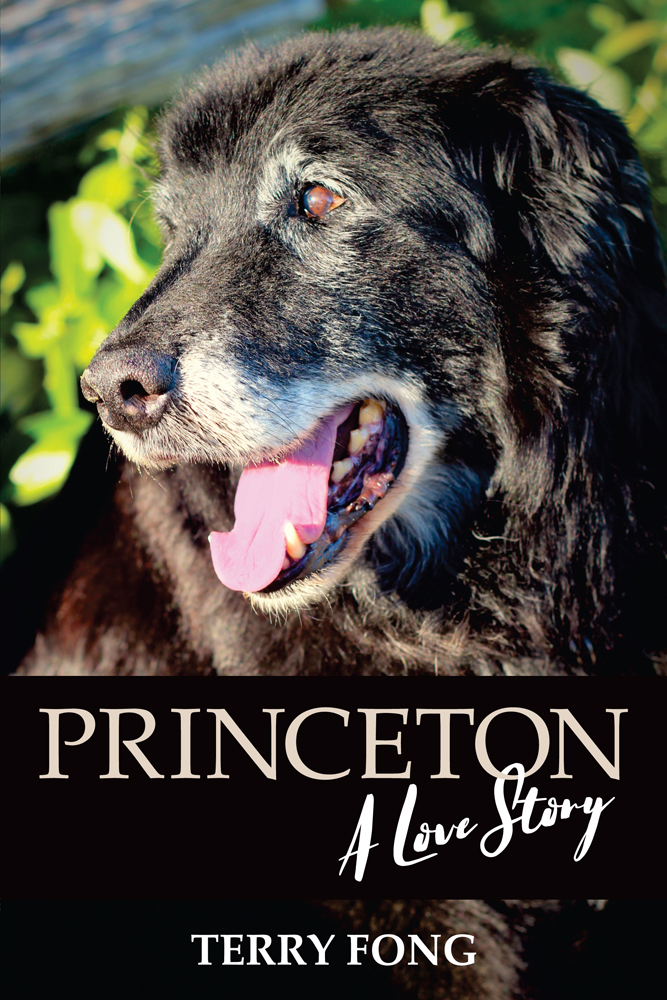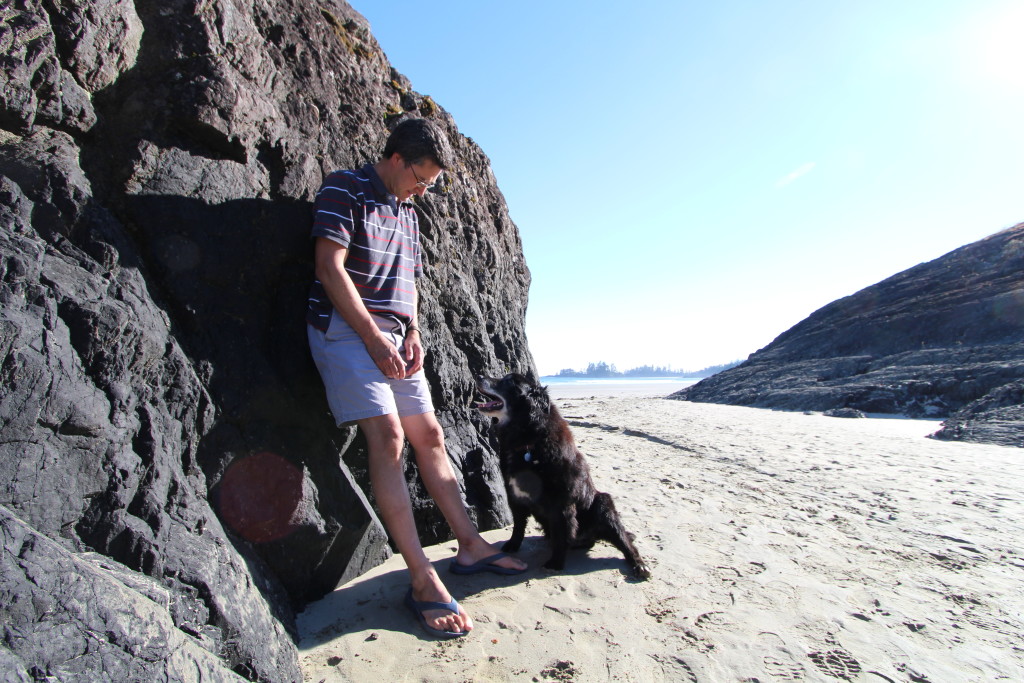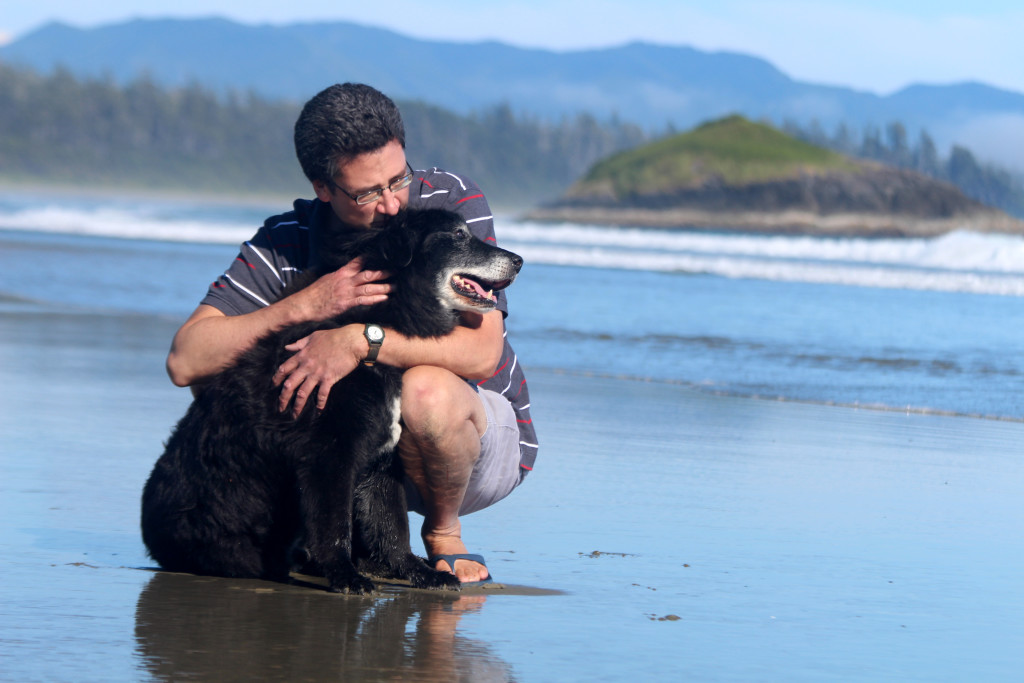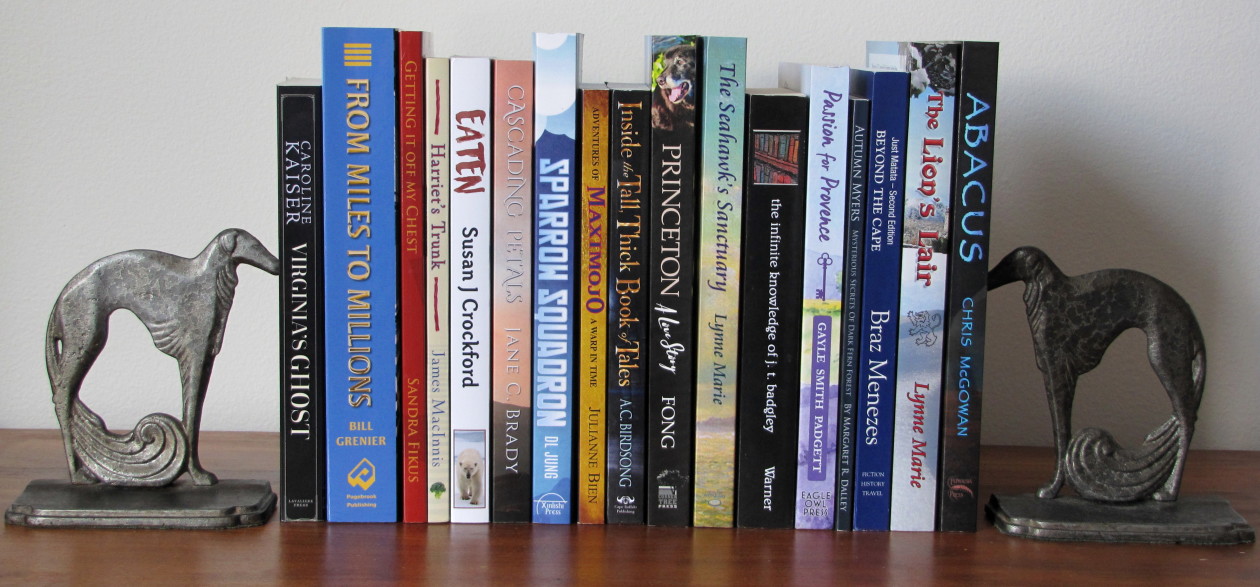Princeton, a border collie and black Lab cross, was no ordinary dog. And Terry Fong, the author of Princeton: A Love Story and an Alberta poultry farmer, was no ordinary dog owner. Princeton and Terry were the very best of friends, and they shared the deepest possible bond and an unwavering commitment to one another. At the age of twelve, Princeton was diagnosed with canine osteosarcoma and given a year to live, but thanks to the efforts of dedicated veterinarians and Terry’s unflagging support, the dog defied the odds and lived for several more years. Terry wanted to ensure that Princeton’s remaining years were as rich and as joyful as possible, so the two embarked on amazing journeys through Western and Northern Canada, and they touched the hearts of everyone they met. I spoke with Terry about Princeton: A Love Story.

Caroline: I’m not going to lie—of all the books I’ve edited in my twelve years of freelance editing, your book made me cry the most. But often it made me laugh out loud too, as Princeton could be such a clown. I fell hopelessly in love with him, and it seems that everyone he met did too. What was it about Princeton that endeared him so to people? What qualities did he possess that made him so special to you?
Terry: I think what endeared Princeton to me and others was his resilience and happy-go-lucky demeanour. During the seventeen years Princeton and I lived together, I never saw him once feel sorry for himself. He was the type of dog who relished every waking moment and refused to let any hardship deter him from his love of life. He especially loved being a farm dog, as it gave him a purpose to accompany his can-do attitude. During his battle with cancer, I think this attitude served him well. People were always impressed when they saw the old three-legged dog hop around as if there was nothing bothering him.
Another quality that made him so special to me was his loyalty. Often our days around the farm would be twelve to sixteen hours long. Princeton would rarely leave my side, regardless of the weather or regardless of any personal hardship he may have been suffering. I will always think of him as the most devoted friend I will ever have. I also know I will have no greater friend for the rest of my life.

Caroline: Your book is searingly honest. We watch as Princeton undergoes a series of complex medical procedures, and we see how this affects him and you. But in between these episodes, the book often brims with humour. For readers, it’s a roller-coaster ride of emotions. If I’d gone through the emotional pain you obviously went through during Princeton’s decline, I’m not sure I could have found it within myself to write about such experiences. What was it like for you to revisit that time by writing about it? And what were you hoping to accomplish by writing about Princeton’s life?
Terry: There were many difficult times while writing Princeton’s memoir. I started writing a few weeks after his death, only finding the time to do so between 2:00-3:00 a.m. every day. This went on for two years. There were times I would find myself crying, thinking of everything we went through together. But as you said, the book also has many humorous moments throughout. While writing the initial manuscript, I didn’t intend it to be humorous, much the same way I never intended it to be sad or difficult. The words I wrote were simply a reflection of the life Princeton and I shared together. Our relationship was very special, and I know we both looked at things the same way. I suppose that as difficult it was at times to revisit the points of our life together, it was also an honour to think of them again.
As I’m sure you recall from when we first spoke, I still wasn’t convinced I was ever going to let anyone read about the life Princeton and I shared. Maybe this is why I managed to get through it. I was writing the manuscript for me and Princeton only, and however painful the memories were at times, they were still the memories of us together and they needed to be written. And If things were especially difficult, I would remind myself of a promise made to Princeton before he died: that I would write of our life together.
Caroline: Princeton: A Love Story stayed with me for a long time after I’d finished working on it—it made a deep impression on me and made me very conscious of how precious the time I spend with my own dog, now quite senior, is to me. What sort of things do you hope people will take away from your book? And how have readers reacted to it so far?
Terry: I suppose I’m being selfish, but what appeals to me most about people reading Princeton’s memoir is knowing that he continues to live on. Not just in my memories but in the thoughts of others as well. Besides that, it makes me so happy knowing that some people who read the book will honour their own relationships with their pets maybe just a little more. Not to say they don’t in the first place, but perhaps they’ll realize there is no shame in the way they love their pets. One veterinarian who read the book commented on this, saying that reading about the relationship Princeton and I shared will make others aware that the bond between human and animal can be one of the most rewarding we as people can ever have.
I recall on one occasion a veterinarian and educator went to an Chapters Indigo store shortly after the book’s release and purchased ten copies to share with his family and others in his profession. Not only was I proud of this, but I know Princeton was as well.
Another thing I hope others take away from the book is that a prognosis, however grave, doesn’t always mean imminent death or even hardship. Veterinary medicine, like all types of medicine, isn’t always a hard science. There are always exceptions, and often these exceptions arise from giving an animal a chance and supplying hope. Sometimes it’s hope that’s needed most.
Interestingly, I’ve heard other readers comment that the book reminds them of relationships they have had with their human counterparts. People they’ve lost to cancer throughout the years. Others have commented that what has been most memorable for them after reading the book is all the great places Princeton and I visited. I guess the books leaves different impressions on different readers, and I think that’s most important when telling a story.

Caroline: You and Princeton travelled extensively despite the state of his health; you went to extraordinary lengths to make his last few years as happy as you possibly could. Is there a particular trip that stands out for you, and if so, what made it so significant? What do you think was Princeton’s favourite place, and why?
Terry: I think the most memorable trip we took was our adventure up north in the Yukon. Not because it was necessarily better than any of the other trips we took, but because it was somewhere Princeton and I had never visited before. From the never-ending daylight hours to the grumpy insects, it’s something I will never forget. And the solitude was special as well. Never-ending twisting highways without seeing anyone for miles. We loved that.
Our favourite place was Tofino. Without a doubt. Princeton and I loved the beaches and the ocean. It was a tranquil place for us both. We belonged there. In time he and I will return there together, as I would like his and my ashes scattered in the water. When we weren’t on the beaches, we were having dinner or hanging out with friends we made when we first arrived there. We visited Tofino over two summers, and it felt like our second home.
Caroline: Do you have a new writing project in the works? If so, what can you share about it?
Terry: When I was in grade school and university, I was told writing should be my profession. I’m still not sure if I agree with this. I still think Princeton’s memoir is a wonderful story told by a mediocre writer. Nonetheless, I have started another project. And like the one before, I’m not sure if it will be shared. If I do decide to have others read what I’ve written, however, I don’t think it could ever compare to what I wrote about Princeton.
Caroline: Where is your book available?
Terry: The book is moving in a direction of its own. Most Chapters Indigo and Coles stores in the Edmonton area now stock the book. More have made verbal commitments to do the same, including those in other provinces. By the end of the year, I hope it’s available in stores throughout Canada. Not only have they been very supportive, but so has Audreys Books in downtown Edmonton. Blackberry Cove Marketplace in Ucluelet, Vancouver Island, now stocks the book as well. The book can also be purchased online from Amazon.ca and Amazon.com. Ebook to follow very shortly.
For further information or to contact Terry Fong, please visit Corner Tree Press.

 Follow
Follow